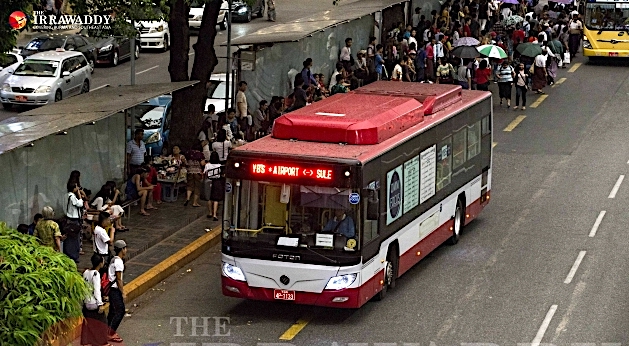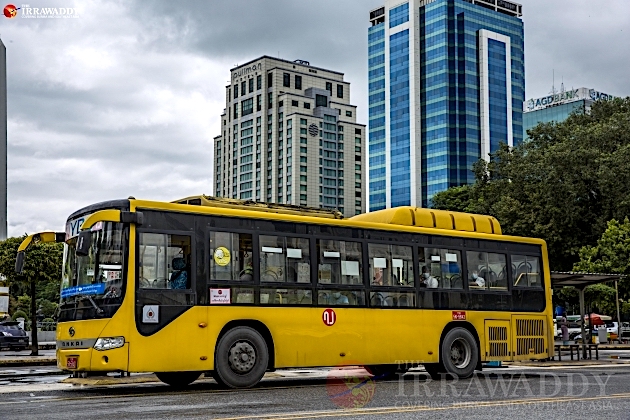Omni Focus, a company owned by Kyaw Ne Win, a grandson of ex-dictator Ne Win, and military-owned Bandula Transport Co are planning to run electric vehicles (EVs) in Yangon, fulfilling junta chief Min Aung Hlaing’s promises.
Currently, 18 companies run over 100 bus lines in Yangon’s bus transport network, Yangon Bus Service (YBS). But other companies are reportedly less interested in EVs due to the low potential profitability and irregular electricity supplies.
The two companies will start with 50 Chinese-made electric buses each.
A YBS company manager said: “It requires huge investment. The return on investment is expected to take 15 to 30 years. No YBS company wants to do it because the country still does not meet the requirements.”

The junta-controlled Yangon Region Public Transport Committee has instructed his company to run electric buses, he said.
Charging stations will cost 100 million kyats (around US$35,000 at the market exchange rate) per EV and electricity bills will cost 30,000 to 40,000 kyats per charge for a vehicle, he said.
“We would need to invest between 300 and 400 million kyats to run an EV, so no one is interested,” he added.
Omni Focus has won a license from the junta-controlled Commerce Ministry to import 200 electric buses and taxis, according to automobile trade sources.
The Irrawaddy could not independently verify their reports.
Omni Focus reportedly plans to use electric buses in its line linking downtown Yangon and Yangon International Airport.
The company declined to comment.
Disputes arose in 2017 between Omni Focus and AYA Bank owned by military crony U Zaw Zaw when it failed to repay a loan of 56 billion kyats borrowed in 2017 from the bank.
Military-owned Bandula reportedly plans to operate electric buses in YBS and long-distance coaches. The regime is planning to build charging stations in Naypyitaw and along the Yangon-Mandalay Highway but has failed to address the lengthy blackouts.
Bandula was unavailable to comment.

A YBS company owner said: “It can operate [EVs] because it has investment capital. But it is not easy for other companies.
“The regime lacks US dollars and is struggling to prevent dollars from flowing out of the country. They won’t allow foreign currency reserves to go out of the country easily. I think the project will only end up as a pilot project with a small fleet of EVs,” he added.
The first batch of 40 EVs from China arrived last week, junta newspapers reported on Wednesday. Chin Dwin Shan Co will run 10 electric taxis from Yangon airport, while NPK Motors will run 10 cabs from Thabyaygon Market in Naypyitaw.
The taxi companies chose the e2 model from Xi’an-based BYD after the regime granted import licenses to 26 companies.
The regime has banned imports of vehicles, spare parts and other commodities due to dwindling foreign currency reserves. It has, however, waived the import tax on electric trucks, cars, three-wheelers, motorbikes and spare parts until the end of the financial year in March.
One auto dealer said: “The regime wants EVs in use. Those companies were assigned to make it happen. Yes, we should all switch to EVs one day but how can it work while there is no regular supply of electricity?”

















